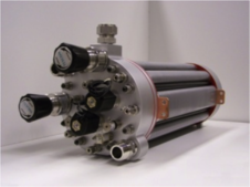NASA requires advanced energy generation and storage devices capable of withstanding challenging environments encountered in the agency’s missions. These awards will help the development of such novel energy storage devices.
 A model of a 3-kilowatt fuel cell that could be used for deep space power applications. (Image Credit: NASA)
A model of a 3-kilowatt fuel cell that could be used for deep space power applications. (Image Credit: NASA)
The following are the four technology proposals selected by NASA:
- The University of Maryland’s proposal on safe lithium-sulfur energy storage based on garnet electrolyte
- Indiana University in Bloomington’s proposal on advanced high energy rechargeable lithium-sulfur batteries
- California Institute of Technology’s proposal on high energy density and durable Li-S batteries for use in the aerospace industry
- Amprius’ proposal on the development of cells based on silicon anode for high specific energy systems
Phase I awards worth $250,000 are for a component test and analysis phase that extends for eight months. Phase II awards are up to $1 million for one year, which helps fund an engineering development unit hardware phase.
Phase III is the prototype hardware development phase, involving funding of up to $2 million per proposal for 18 months. The Game Changing Development program is managed by the Langley Research Center of NASA for the Space Technology Mission Directorate.
New energy storage technology will be critical to our future exploration of deep space -- whether missions to an asteroid, Mars or beyond. That's why we're investing in this critical mission technology area.
Michael Gazarik, associate administrator, Space Technology at NASA Headquarters
NASA, in close cooperation with DOE’s Advanced Research Projects Agency (ARPA-E) and other organizations, promotes the development of sophisticated energy storage systems for use in its future human and robotic exploration missions.
The Space Technology Mission Directorate of NASA will invest a significant amount in the coming year to develop technologies critical for deep space exploration.
Disclaimer: The views expressed here are those of the author expressed in their private capacity and do not necessarily represent the views of AZoM.com Limited T/A AZoNetwork the owner and operator of this website. This disclaimer forms part of the Terms and conditions of use of this website.